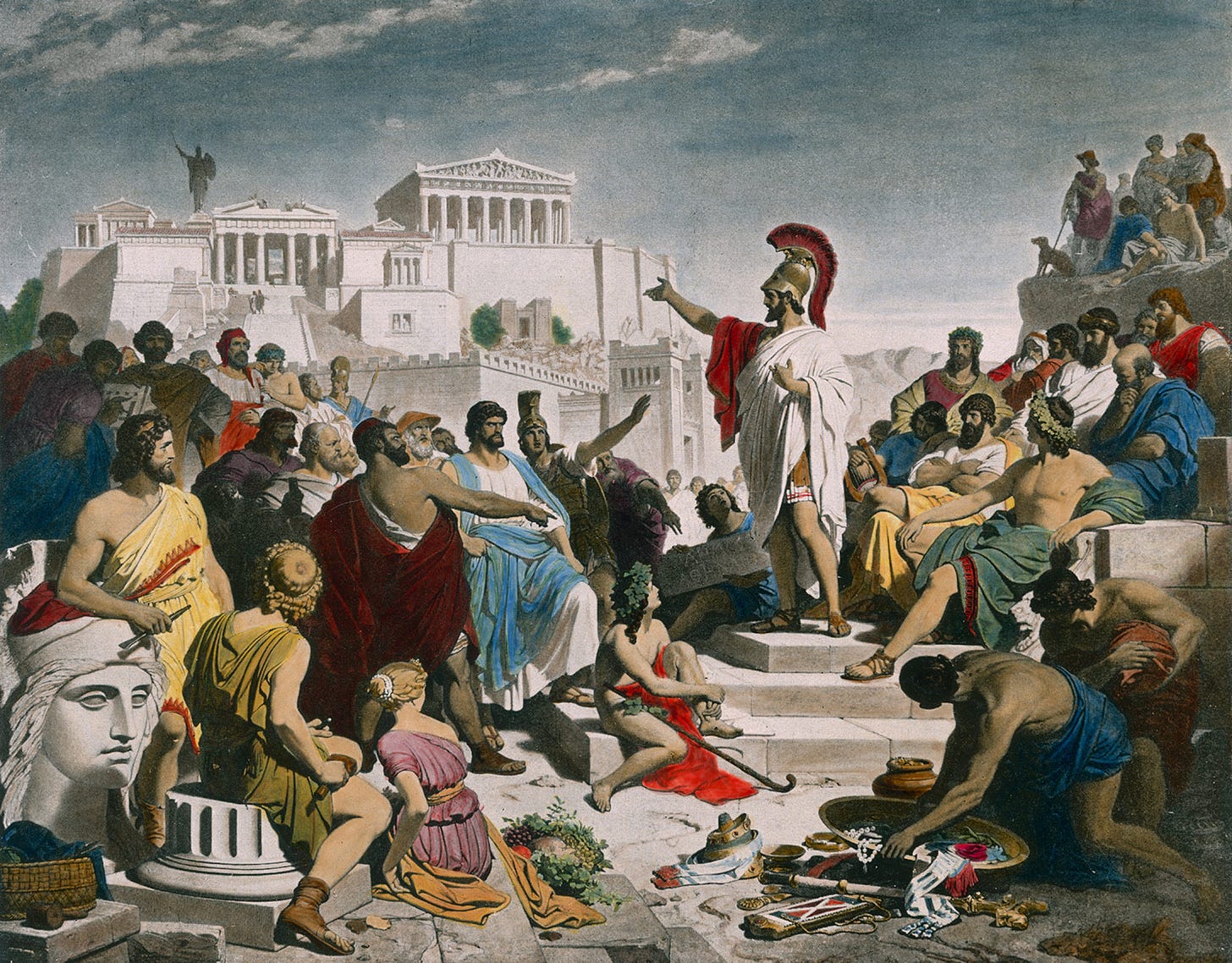A Discourse on Democracy
Right-Wing Progressive Democracy OR Why The Way You Think About Democracy is Wrong
Prior to laying out the ideal principles of political organization, it is necessary to provide a short discourse on democracy. The primary unspoken assumption of any democratic theorist is that greater democracy must result in greater agency. Tectocracy does not differ in this by a bit. However it has been an observation of mine that not a single political theorist has been able to dissect democracy into two or more basic components without reference to institutions or groups. Practically all of the political theorists who tilt leftwards regard democratic progress as consisting in perpetually expanding itself to as many people as possible without distinction to the natural and acquired characteristics of the people participating in politics. Meaning, they could not theorize the most basic abstract division of democracy, which is the division of democracy into its horizontal (quantitative) and vertical (qualitative) components. Horizontality refers to the overall number of people potentially participating in politics, while verticality refers to the required competence level of a potential voter in order to participate in-effect. In practice, a democracy that is both highly horizontal and vertical is theoretically open to every single person within the realm, while for a person to express his political will in actuality, they must ascend to a status of a voter by withstanding strong selective pressures that only a few percentage of the population can ever achieve in practice. The opposite of this, is a form of democracy with low horizontal and vertical reach, meaning a democracy in which only a small number of people is theoretically able to partake in without having to undergo any quality controls that would demonstrate their level of competence.
Unfortunately, due to the innate leftward biases of our political theorists, the qualitative aspect of democracy never becomes acknowledged as anything but a reactionary remnant of the aristocratic old order, yet the old aristocratic order was constructed on the basis of inherited status, as opposed to the basis of competence that can be demonstrated with ability. One dimensional view of democracy in-effect got rid of quality controls that must be placed on the voters and reordered the thinking of all major political theorists to be placed upon a single axis of quantity, in which political progress implies expanding access to political participation to everyone, which often-times finds itself converging with socialist and universalist moral sentiments, thus becoming mutually self-reinforcing. To argue for a socialist economic model, a socialist often says that the workplace must be organized with the principles of direct democracy, bypassing and abolishing property rights, while a left-wing moralist says that it is our duty to extend our moral compassion to every living being on the planet and beyond, removing any particularist and kin-based attachments in the process. Just as in the realm of politics, these delusions are futile in the sense that they lack qualitative discrimination in favor of a greater function.
In effect, every single Western liberal democracy would score high on the quantitative dimension of democracy, yet simultaneously score highly deficient in the qualitative dimension of democracy. Meaning, while there has been a significant progress in the horizontal axis of democracy, it has not been accompanied by an equal progress to the selective dynamics of these new voters to whom democracy was just recently extended.
I charge this leftist tendency of preferring quantity over quality with causing greater political dysfunction and inability to ascend to a higher level, for the previous innovations in democracy that have resulted in greater agency, have all been generated by a much more highly selected and smaller political constituency. This simple truth can be observed in nature, market organization and human achievement. Only a fraction of elements in a sphere is responsible for its output and subsequently progressive reorganization, but unfortunately modern democratic polities are artificially constructed in such a way as to suppress the will of the most competent by forcefully equalizing it with the most incompetent. Doing a similar platitude in the market in which the economic output or monetary weight of every person and their property becomes artificially leveled would equal to the most unthinkable manifestation of evil and incompetence known to nature, but for some weird reason it is imagined that politics and democracy in particular must operate in accordance to left-wing moral values as opposed to the basic laws that propel all other systems towards progress.
How must progress occur in a system where its main drivers become artificially suppressed by the deadweight of the incompetent? How must the political apparatus optimize itself into the direction of greater agency, if these incentives never accumulate sufficient weight to transform a system?
The answer is simple. It is impossible, for as long as the present democratic order and the elite that sits at the heart of it is not concerned with function, as much as it is concerned with mobilizing left-oriented identity groups for power as the final consequence of horizontal expansion of democracy - progress is unfeasible by definition. Only when a qualitative change to the managerial apparatus underpinned by adoption of a better moral and epistemological system occurs - a democracy can truly move towards greater function.


